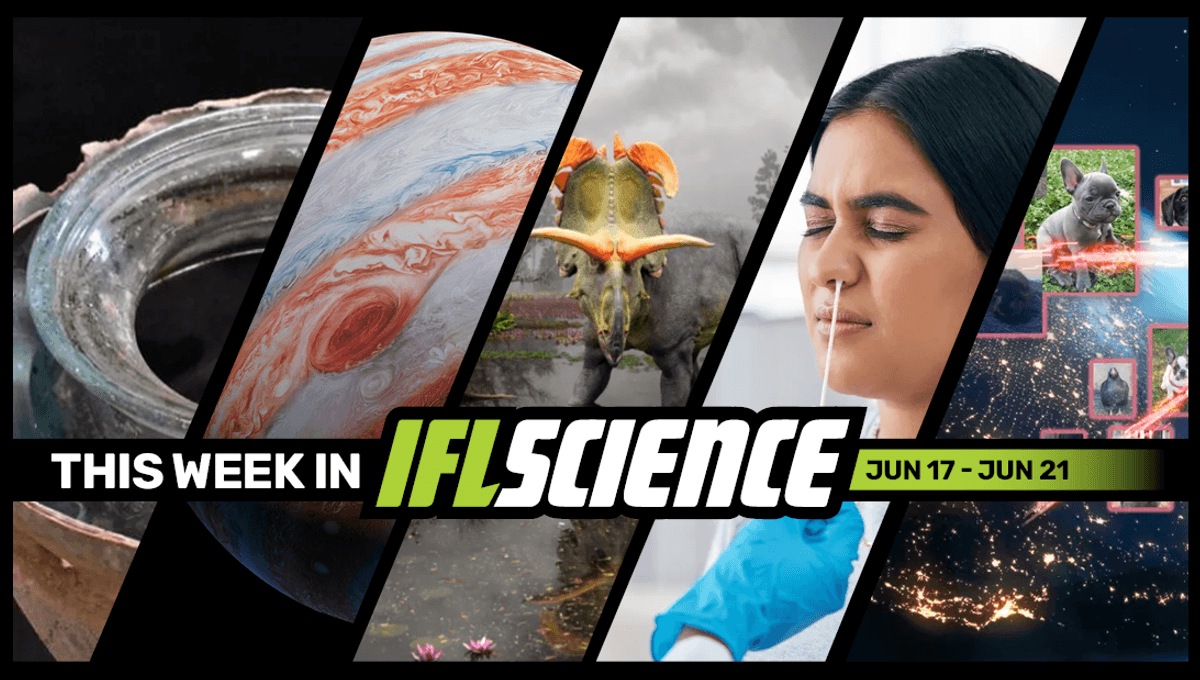
This week, new evidence suggests Jupiter’s Great Red Spot might be younger than the United States, a newly discovered 78-million-year-old dinosaur had a seriously fancy hat, and a never-before-seen immune response has been observed in volunteers deliberately infected with COVID-19. Finally, we explore the fight for ownership over the $17 billion shipwreck of the San José.
Subscribe to the IFLScience newsletter for all the biggest science news delivered straight to your inbox every Wednesday and Saturday.
World’s Oldest Liquid Wine Contains Surprising Ingredient – Cremated Human Remains
A man who died 2,000 years ago in southern Spain had his ashes infused in white wine, probably as part of some sort of ritual to assist him in his journey through the afterlife. Amazingly, the urn containing his booze-drenched remains has managed to keep the ancient plonk from deteriorating, making it the oldest surviving wine in liquid form ever discovered. Read the full story here
Jupiter’s Great Red Spot May Be Younger Than The United States
Jupiter’s Great Red Spot – a storm larger than our whole planet – is one of the most visible features of the Solar System, thought to date to not long after the invention of the telescope, if not much earlier. However, new evidence suggests it instead originated in 1831 and has been mistaken for being a continuation of a previous spot from a century before, making it much, much younger than thought. Read the full story here
Get A Load Of The Fancy Headgear On This New 78-Million-Year-Old Dinosaur
Palaeontologists have struck giant new dinosaur gold with the discovery of Lokiceratops, an ornate beast that was approximately 6.7 meters (22 feet) long, weighed around 5 tons (11,000 pounds), and had a seriously fancy hat. It belonged to a group of vegetarian dinosaurs known as the “centrosaurines,” and dates back 78 million years. Read the full story here
Never-Before-Seen Immune Response Found In Volunteers Deliberately Infected With COVID-19
Would you volunteer to be deliberately infected with COVID-19, all in the name of science? For most of us, the answer is probably a resounding “no”, yet 36 healthy people agreed to do just that as part of the world’s first COVID human challenge study. Now, some new results are in, and they’ve revealed a previously unknown quirk of the immune system that allows some people to clear the virus before it has a chance to take hold. Read the full story here
NASA Is Using Its Fancy New Laser System To Send Astronauts Videos Of Pets
NASA has built its first two-way end-to-end relay system to send messages to and from the International Space Station (ISS). It used the 1.2 gigabits per second capacity (that’s faster than your home internet) fancy laser system to send the astronauts currently aboard the station photos and videos of cats, dogs, and the occasional parrot. Read the full story here
TWIS is published weekly on our Linkedin page, join us there for even more content.
Feature of the week:
The Messy Fight Over Who Owns The $17 Billion Shipwreck Of The San José
On the bottom of the seafloor near Colombia, surrounded by fish and three centuries of sediment, there sits a shipwreck loaded with millions, perhaps billions, of dollars worth of treasure. The sunken remains of the San José have charmed the eyes of many contenders who claim they are the rightful owners. However, as valuable as its riches may be, monetary fortunes are only the beginning of this relic’s value. Read the full story here
More content:
Have you seen our e-magazine, CURIOUS? Issue 23 June 2024 is out now. Check it out for exclusive interviews, book excerpts, long reads, and more.
PLUS, season 4 of the The Big Questions podcast launches next week. Catch up with all previous episodes here now.
Source Link: World’s Oldest Liquid Wine Contains Human Remains, NASA Uses New Laser System To Send Astronauts Videos Of Pets, And Much More This Week